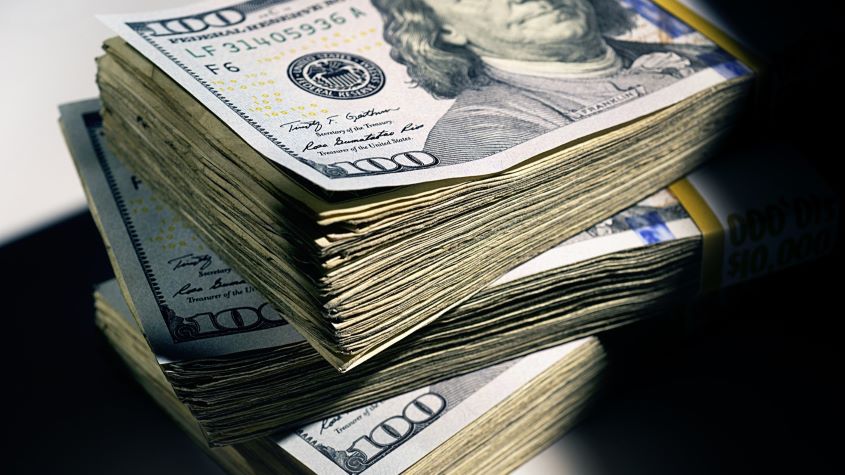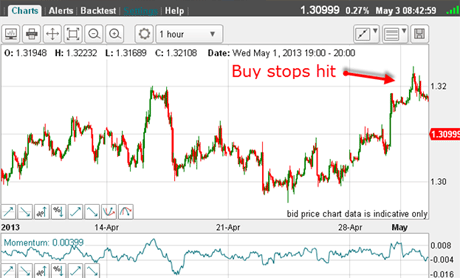Profit from volatility with forex
While markets hate uncertainty, it can also present opportunities. And the extra volatility it has created in the foreign-exchange market recently has created a wealth of possibilities for the short-term trader, says professional investor Jane Foley. Here, she explains how to profit.
Get the latest financial news, insights and expert analysis from our award-winning MoneyWeek team, to help you understand what really matters when it comes to your finances.
You are now subscribed
Your newsletter sign-up was successful
Want to add more newsletters?

Twice daily
MoneyWeek
Get the latest financial news, insights and expert analysis from our award-winning MoneyWeek team, to help you understand what really matters when it comes to your finances.

Four times a week
Look After My Bills
Sign up to our free money-saving newsletter, filled with the latest news and expert advice to help you find the best tips and deals for managing your bills. Start saving today!
Each week, a professional investor tells MoneyWeek where she'd put her money now. This week:Jane Foley, research director at Forex.com.
The markets hate uncertainty. It can send investors in risky assets flocking for the doors; within the stockmarket it is associated with a bearish trend. But uncertainty can also create opportunity. Indeed, the extra volatility it has created in the foreign-exchange market has created a wealth of possibilities for the short-term forex trader.
As Greece's fiscal crisis spread beyond its boundaries, through the eurozone and beyond, speculators used short positions to bet against the euro. As contagion spread, EU officials were eventually forced to take the bull by the horns. An EU and International Monetary Fund (IMF) bailout fund of €750bn has been agreed. The massive package swept aside fears that the Greek government would default on its debt obligations in the foreseeable future and triggered a huge (though short-lived) relief rally in global markets.
MoneyWeek
Subscribe to MoneyWeek today and get your first six magazine issues absolutely FREE

Sign up to Money Morning
Don't miss the latest investment and personal finances news, market analysis, plus money-saving tips with our free twice-daily newsletter
Don't miss the latest investment and personal finances news, market analysis, plus money-saving tips with our free twice-daily newsletter
However, the plan fails to provide any guarantees that Greece will start living within its means. It is still possible that Greece will have to default on its debt obligations and potentially be released from the European monetary union altogether. And despite attempts by the EU to calm the crisis, event risk in the eurozone is still very much alive. As a consequence, the euro could retain a negative bias for some time yet.
Meanwhile, American economic fundamentals are currently far from perfect. However, the eurozone crisis is good news for US dollar assets. The American budget deficit could be above 11% of GDP this year not far behind Greece's (13.6%). An aggressive American fiscal repair job is highly likely to start next year and this will hinder growth. The fact that America operates as a federal system and not as a cluster of sovereign states means that policy responses are clearer cut.
- Spread betting The easy way to geared, tax-free returns
- Forex trading- How to profit from currency movements
For the time being, the crisis in the eurozone is likely to end speculation that global central banks will diversify away from US dollars in favour of the euro.
The world's second-biggest economy, Japan, suffers from huge debts, an ageing population and a declining savings ratio. So there's a huge fiscal problem looming for the next generation. That means the yen is no real contender either for reserve currency status.
This all suggests that a period of broad-based US dollar strength could be approaching. So any further squeezes higher in the EUR/USD rate may prove good USD buying opportunities. EUR/USD could be headed towards its long-term average of 1.18 and potentially lower.
In recent weeks investors have been reluctant to extend bets against sterling. It seems investors have been giving the British government the benefit of the doubt with respect to dealing with the enormous 11.5% of GDP budget deficit.
However, going forward sterling could be a harsh policy critic if the Liberal-Conservative coalition fails to deliver on budget reform. But the initial signs are good. Further progress could see EUR/GBP pushing back towards 0.800 on a three-month view.
Finally, this month the Australian government announced that its budget should be back in surplus by 2012/2013. The Australian economy has benefited from its proximity to China and there is already a lot of good news priced into the dollar. That said, the poor outlook for the euro suggests there is potential for further gains to be squeezed out of AUD/EUR.
Get the latest financial news, insights and expert analysis from our award-winning MoneyWeek team, to help you understand what really matters when it comes to your finances.
-
 How a ‘great view’ from your home can boost its value by 35%
How a ‘great view’ from your home can boost its value by 35%A house that comes with a picturesque backdrop could add tens of thousands of pounds to its asking price – but how does each region compare?
-
 What is a care fees annuity and how much does it cost?
What is a care fees annuity and how much does it cost?How we will be cared for in our later years – and how much we are willing to pay for it – are conversations best had as early as possible. One option to cover the cost is a care fees annuity. We look at the pros and cons.
-
 Why you should keep an eye on the US dollar, the most important price in the world
Why you should keep an eye on the US dollar, the most important price in the worldAdvice The US dollar is the most important asset in the world, dictating the prices of vital commodities. Where it goes next will determine the outlook for the global economy says Dominic Frisby.
-
 Are we heading for a sterling crisis?
Are we heading for a sterling crisis?News The pound sliding against the dollar and the euro is symbolic of the UK's economic weakness and a sign that overseas investors losing confidence in the country.
-
 What the Latin Monetary Union – Europe’s forgotten currency – can teach us about the euro
What the Latin Monetary Union – Europe’s forgotten currency – can teach us about the euroOpinion The euro isn’t the continent’s first flawed single currency, says Jonathan Compton. The Latin Monetary Union lasted 61 years.
-
 Currency Corner: A lesson from two of the world’s “hardest” currencies
Currency Corner: A lesson from two of the world’s “hardest” currenciesFeatures Dominic Frisby looks at the Swiss franc and Singaporean dollar and what our politicians can learn from these two fiscally responsible nations.
-
 Betting on politics: deal or no deal
Betting on politics: deal or no dealFeatures Matthew Partridge looks at the bookies' odds on the UK leaving the EU with no deal.
-
 Betting on politics: how my tips have fared over the last three years
Betting on politics: how my tips have fared over the last three yearsFeatures It's been three years since Matthew Partridge launched his Betting on Politics column. As you might expect, he's some failures – but he's had a lot more successes
-
 Where did it all go right for the euro?
Where did it all go right for the euro?Sponsored SPONSORED CONTENT - The European currency is alive and kicking. Jake Trask, research director at forex house OFX, explains how the euro became a strong and stable currency, and the outlook for investors.
-
 Record low interest rates – how did the euro react?
Record low interest rates – how did the euro react?Features The euro's reaction to the interest rate decision punished many erring traders - on both sides of the market, says John C Burford. Here, he surveys the fallout, and plots his next trade.